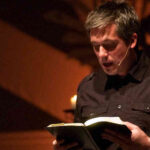Someone I know had an interesting picture come into their mind recently.
They were lying in bed, about to drift off, when they “saw” a group of people standing near the edge of a cliff, a little like the one in the picture above. The people were looking this way and that over unexplored territory.
In the picture, they were christian leaders, and they were trying to discern how God was leading them in the new world we find ourselves in as Covid-19 changes so much of our lives.
This picture chimes with some interesting observations.
Q: How many christians does it take to change a light bulb?
A: Change ????
It’s an old joke, but it highlights how hard it can be for many churches to try something different.
As one church said recently: “When you do something in church once, it’s innovative. When you do it twice, it’s a tradition. And when you do it a third time, you hear people say: “We’ve always done it that way!”
Missiologist Mike Frost recently blogged about how “while we’ve longed for things to get back to normal, we also keep telling each other that there will be a new normal, that in some ways things will be very different in a post-COVID-19 world.”
This is true in churches as it is in the wider world. The example he chooses is preaching, suggesting that 10 minute sermons or homilies may be the new normal similar to a view I argue for in Sermons – a poor way to make disciples). He says:
“Perhaps COVID-19 will be the unwanted and unpleasant catalyst that will force Protestant churches to reshape our methods of teaching, as well as our liturgies, to align more with what we know about the ways people like to learn.”
Action as well as talk
I have been encouraged to see churches that are seriously asking God to show them how they need to change to see the kingdom of God come in this new “normal”.
Love your neighbour
The Covid-19 pandemic has brought great stress and difficulty for many people, even in our affluent communities. Many people need emotional and tangible support.
So many churches have jumped at the opportunity to serve the communities around them.
In the UK, more than a hundred churches have joined together in the Love Your Neighbour network, to offer food or a phone call to people around them doing it tough, providing specialised advice, helping out at hospitals, and providing hot meals for hard-working emergency workers, hospital staff and school students.
I have heard of other churches, in Australia and elsewhere, starting or enlarging their food banks, or supporting food banks operated by other organisations.
Are services the best way to disciple people?
I have heard of two churches who have decided that online services are not the best, or only, way to make and equip disciples.
One is developing a fortnightly pattern, with services on the first Sunday of the fortnight, but only a shorter prayer meeting on the second Sunday. The leadership team argues that listening to a sermon (or zoning out during it!) isn’t enough to equip God’s people for works of service (Ephesians 4:12).
(It was never enough, but it has taken a pandemic to assist this forward thinking leadership team to understand this.)
Instead of the second service in the fortnight, discipleship groups will be ramped up. Church members are being encouraged to not only attend one of these groups, but to take greater responsibility for their own discipleship. Resources are being prepared to better equip group leaders and church members in growing in their faith.
Some churches in the UK have found that a lot of non-church people are watching their online services, and joining online Alpha groups in much greater numbers than normal. These churches are considering retaining the online events even when they are not restricted in face-to-face meetings, because it is clear that God is using them.
Praying …. and expecting some new
A number of churches are praying for God’s guidance in entering this new territory. Some have found inspiration in passages from the Old Testament prophets:
“Give careful thought to your ways.” (Haggai 1:5)
“I will lead the blind by ways they have not known, along unfamiliar paths I will guide them …. Forget the former things; do not dwell on the past. See, I am doing a new thing!” (Isaiah 42:16 & 43:18-19)
It seems that some believe that God has new opportunities for them in our destabilised world, and they don’t want to miss the moment.
Another picture

The picture of the leaders examining the vista before them to explore new paths wasn’t the only one.
A second picture followed the first. It showed a kindly pastor gently placing his congregation members into a box like a child packing away his toys, as he prepared to return to doing things exactly the way they had been done before.
He knew that way would be easier for all of them.
Is God speaking to us?
Some of the churches I respect most are saying: “Don’t miss the opportunity!” They are urging their congregations to “Reset“, to listen for the Holy Spirit, to be ready for change.
I think it may be a case of having the ears to hear and the eyes to see. Or not.
You may also like
Main graphic: First European crossing of the Blue Mountains near Sydney in 1813 (Wikipedia). Smaller graphic: marteelkanah9 on FAVPNG/




